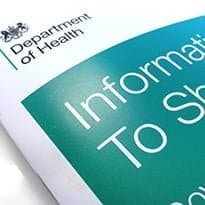The government has declined to back down over the use of patient confidential data for commissioning, despite an outcry from clinical commissioning groups and companies attempting to work with them.
The Department of Health’s full response to Dame Fiona Caldicott’s second review of information governance, published today, restates her view that commissioners should be able to meet their objectives using pseudonymised data.
‘Information: To Share or not to Share- Government Response to the Caldicott Review’, agrees with all the recommendations of the Caldicott 2 review.
Health secretary Jeremy Hunt used the launch of the response this morning to emphasise that this should give patients confidence in the use of their data, and that opt-outs from data sharing agreements would be respected.
He told a press conference that he was aware the current situation had led to “some problems on the ground” when it came to commissioning, but that said the DH would be publishing more guidance on this shortly.
“I think the rules are fine; it’s just that the way we are implementing it at the moment has run into some difficulties, and we have to crack that. I can’t tell you an exact date,” he said, adding that: “It won’t be months.”
The second Caldicott review was set up in response to the work of the NHS Future Forum, lead by Professor Steve Field, which recommended that the balance between information governance and information sharing should be revisited.
Overall, the review aims to balance the need to keep confidential information confidential with the need to share it across health and social care teams and to use data for research.
In doing so, however, it stresses that patient identifiable data should only be used for the direct care of the patients, and that anonymised or pseudonymised data should be used for other purposes, including commissioning.
Primary care trusts used a section 251 exemption to handle patient identifiable data. This was not transferred to clinical commissioning groups by the Health and Social Care Act that implemented the latest round of reforms.
Commissioners are currently covered by a temporary exemption to enable them to receive patient-identifiable data from NHS England.
However, the government’s response indicates that it does not expect this situation to continue. It is looking to create ‘accredited safe havens’ to hold confidential information, link data sets, and release information to commissioners and others.
The accreditation of ASHs has been delayed for the response. But even if they are put in place, some invoice checking, risk stratification and business intelligence services will not be able to operate in the way that they have done previously.
Speaking at the launch press conference, Kingsley Manning, the chair of the Health and Social Care Information Centre, also said he believed commissioners would be able to do their job without patient identifiable data.
“Overwhelmingly the functions of clinical commissioning groups can be met using anonymised data,” he said.
“We are working with NHS England to define what the requirements are for clinical commissioning groups and commissioning support units for confidential information. Our own view is that it indicates that the requirement for confidential data is very small indeed.”
The government response also highlights that while information sharing is sometimes “essential to provide good care for everyone”, it will only be the minimum amount of information necessary, and that patients should always be allowed to opt out of having their information shared.
“If someone has an objection to their information being shared beyond their own care, it will be respected. All they have to do in that case is speak to their GP and their information won’t leave the GP surgery,” said Hunt.
The implications of Caldicott2 will be explored at EHI Live 2013 in a new stream: ‘Information sharing – making Caldicott2 work.’ EHI Live 2013 is a two day conference and exhibition at the NEC in Birmingham from 5-6 November. This year, the show is free for all visitors to attend.

